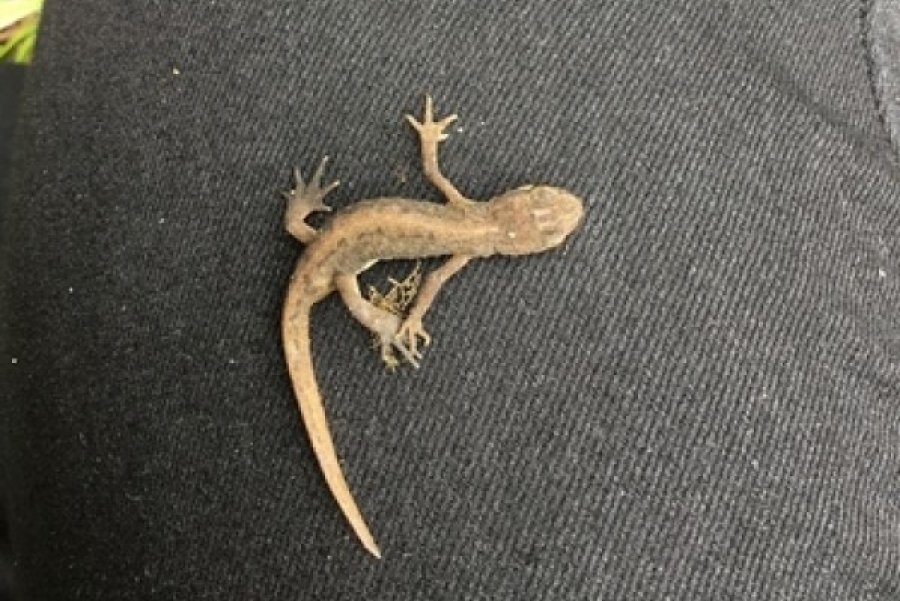The Smooth Newt (Lissotriton vulgaris), also known as the common newt, is a small amphibian found across much of Europe and parts of Asia. It is known for its smooth skin, aquatic lifestyle, and distinct breeding behaviors. Here’s a detailed overview of this fascinating species:
Key Features of Smooth Newt
1. Physical Appearance:
- Size: Adult Smooth Newts typically measure between 3 to 5 inches (7.5 to 12.5 cm) in length, with males generally being slightly larger than females.
- Coloration: They have a variable coloration, which can range from brown to olive-green or grayish, with a lighter underside. The skin is smooth, as the name suggests.
- Distinctive Features:
- Males: During the breeding season, males develop a crested dorsal ridge along their back and a more pronounced tail, which they use to attract females.
- Females: Females have a more rounded body and do not develop the crest.
- Spots and Markings: Both males and females may have dark spots or flecks on their backs, providing camouflage against predators.
2. Habitat:
- Aquatic and Terrestrial: Smooth Newts inhabit a range of environments, including ponds, marshes, and slow-moving streams for breeding, as well as woodlands, grasslands, and gardens during their terrestrial phase.
- Breeding Sites: They prefer shallow water bodies with abundant vegetation for laying eggs, which provides cover for the larvae.
3. Life Cycle:
- Breeding Season: Breeding occurs in early spring to early summer, typically from March to July, depending on the region.
- Courtship Behavior: Males perform elaborate courtship displays, swimming around females and displaying their crests to attract them.
- Egg Laying: Females lay eggs individually, attaching them to submerged plants. A single female can lay up to 200 eggs in a season.
- Larval Development: The eggs hatch into aquatic larvae after about 2 to 3 weeks. The larvae are small, typically around 0.5 inches (1.2 cm) long, and develop into juvenile newts over several months.
- Metamorphosis: After about 2 to 4 months, the larvae undergo metamorphosis, developing into juvenile newts that venture onto land.
4. Behavior:
- Nocturnal Activity: Smooth Newts are primarily nocturnal, coming out at night to hunt for food.
- Aquatic Lifestyle: While they spend significant time in water during the breeding season, they are also comfortable on land, where they hide under rocks, leaf litter, and logs during the day.
- Hibernation: In colder climates, they may hibernate during the winter months, burrowing into the soil or hiding under debris.
5. Diet:
- Carnivorous: Smooth Newts primarily feed on a variety of small invertebrates, including:
- Aquatic insects (e.g., mosquito larvae)
- Worms
- Snails
- Small crustaceans
- Feeding Technique: They use their tongues to capture prey, which they often hunt at night when they are most active.
6. Defense Mechanisms:
- Camouflage: Their coloration helps them blend into their surroundings, making it difficult for predators to spot them.
- Toxic Skin: Smooth Newts secrete mild toxins from their skin, which can deter potential predators.
7. Lifespan:
- Smooth Newts can live for 6 to 10 years in the wild, although some individuals may live longer in favorable conditions.
8. Conservation Status:
- IUCN Red List: The Smooth Newt is currently classified as Least Concern due to its wide distribution and stable populations, but local declines can occur due to habitat loss.
- Threats:
- Habitat Destruction: Urbanization, agricultural expansion, and drainage of wetlands can reduce suitable habitats for Smooth Newts.
- Pollution: Pesticides and chemicals entering aquatic environments can adversely affect their health and breeding success.
- Invasive Species: Competition from non-native species can also threaten local populations.
- Conservation Efforts: Habitat protection, restoration, and creating wildlife corridors are essential for maintaining populations of Smooth Newts in areas where they are declining.
9. Adaptations:
- Aquatic Adaptations: Their smooth skin and streamlined bodies make them well-suited for an aquatic lifestyle, enabling them to swim efficiently.
- Land Adaptations: They are also well-adapted to life on land, using moist habitats to avoid desiccation and predation.
10. Interesting Facts:
- Etymology: The name “smooth newt” comes from their smooth skin, distinguishing them from other newt species that may have rougher textures.
- Color Variation: The coloration of Smooth Newts can vary significantly depending on their habitat and environmental conditions.
- Commonality: Smooth Newts are one of the most widespread newt species in Europe and can often be found in gardens and urban areas, as well as natural habitats.
- Hybridization: Smooth Newts can hybridize with other newt species, such as the Palmate Newt (Lissotriton helveticus), leading to interesting variations in appearance.
11. Threats:
- Climate Change: Changes in temperature and precipitation patterns can impact their breeding sites and overall habitat.
- Road Mortality: Smooth Newts can be vulnerable to traffic when they migrate between breeding sites and their terrestrial habitats.
The Smooth Newt is an intriguing amphibian that plays a vital role in its ecosystem. Conservation efforts are important to protect their habitats and ensure the sustainability of populations in the face of environmental challenges.
